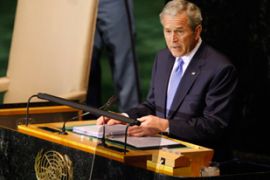Ahmadinejad: US empire nearing end
Iranian president addresses UN general assembly, criticising Western powers.

On the subject of Iran’s nuclear programme, he said that Iran would “resist” Western bullies attempting to prevent the country acquiring civilian nuclear technology, which western nations are fearful could be used to develop nuclear weapons.
‘Defending Iran’s rights’
Refering to the US and its allies he said: “They oppose other nations’ progress and tend to monopolise technologies and to use those monopolies in order to impose their will on other nations.”
He said that Iran “will continue to defend its rights”.
“The Iranian nation is for dialogue. But it has not accepted and will not accept illegal demands.”
Marwan Bishara, Al Jazeera’s senior political analyst in New York, said: “This speech was quite high on generalities and low on specifics.
“It was almost deflated of any particulars. And certainly not approaching any one of those controversial issues that we live today – whether it’s the economy, or the question of the Gulf or Iraq.”
Bishara said Ahmadinejad was “trying his best to present an Islamic discourse … to say that if [the West] is not going to respect, legally speaking, different questions that concerns the international community, he is going to lean back on such things as religious discourse.”
Economic worries
But the global financial turmoil dominated the assembly with Ban Ki-moon, the UN secretary general, urging world leaders to put aside their national interests and show “global leadership” to alleviate world poverty.
 |
| Ban Ki-moon focused on global economic problems [AFP] |
He said the economic problems could have a “very serious negative impact” on the capacity of rich nations to help others achieve their targets – primarily to reduce extreme poverty by 50 per cent.
“We face a global financial crisis. A global energy crisis. A global food crisis. Trade talks have collapsed, yet again,” Ban said as he opened the assembly.
“We must think about how the world economic system should evolve to more fully reflect the changing realities of our time.”
The secretary-general said that the world also faced a “development emergency”.
“We must galvanise global awareness and global action, with a special focus on Africa.”
He criticised the intenational community in assiting with Africa’s development, saying it had “not matched words with deeds”.
Ban also urged stronger action to combat the crisis in Somalia and highlighted the problems for the UN to meet deployment deadlines in Darfur, Sudan.
“If ever there were a call to collective action – a call for global leadership – it is now.”
‘Urgent timeframe’
President Bush also spoke to the assembly on Tuesday, saying that he realised that other nations were watching the US to see how they deal with the economic crisis.
He said that he was confident that the US would act “in the urgent timeframe required” to prevent broader problems.
Talking about the $700bn bail-out package proposed by his administration to fortify the US economy, Bush said: “I can assure you that my administration and our congress are working together to quickly pass legislation approving this strategy.”
Al Jazeera’s Sarah Brown in New York, said meetings at the assembly would also address the Middle East conflict and the Iranian nuclear crisis, among other topics.
Brown said that with the recent conflict in Georgia and the situation in Iran would mean that the atmosphere at the assembly would be tense.
Other speakers on Monday’s session included Nikolas Sarkozy, the French president, and who urged greater regulation of financial markets.
Luiz Inacio Lula da Silva, the Brazilian president, urged for reform of the UN to give it greater power to deal with global economic and security crises.